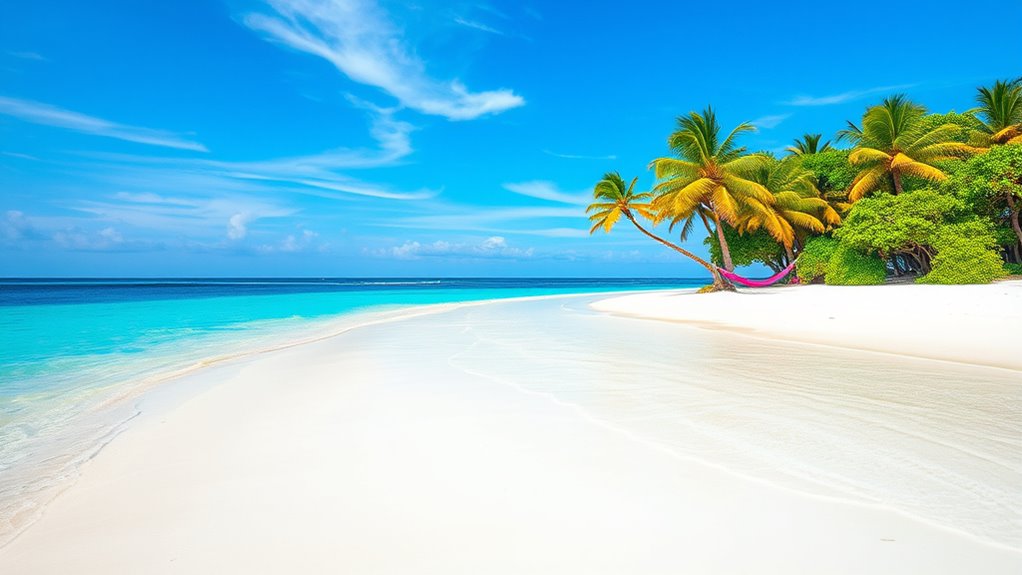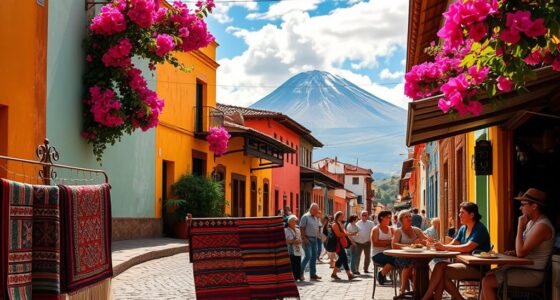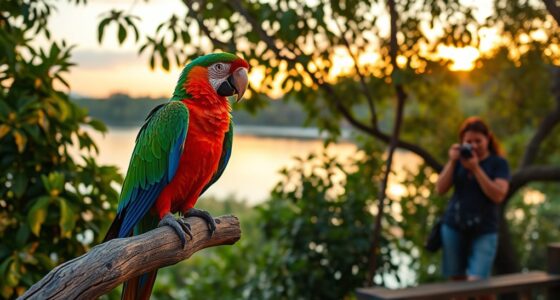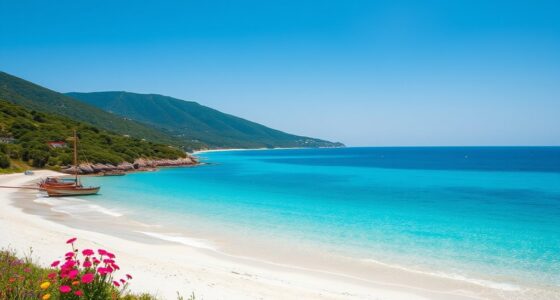To enjoy the pristine beaches of Honduras’s Bay Islands, you can support local efforts to reduce plastic pollution and promote eco-friendly tourism. These islands beauty depends on clean beaches, which protect marine life and boost tourism. Community initiatives, recycling programs, and sustainable practices by visitors all help keep the environment healthy. By participating in or learning more about these efforts, you contribute to a cleaner, healthier paradise that future visitors will also cherish.
Key Takeaways
- Community-led cleanup campaigns and waste management initiatives are actively working to keep Bay Islands beaches free of plastic pollution.
- Sustainable tourism practices and eco-friendly projects promote responsible visitor behavior to preserve the beaches’ natural beauty.
- Local conservation efforts include establishing protected marine areas to safeguard ecosystems from plastic debris.
- Educational programs raise awareness among residents and tourists about reducing plastic use and supporting recycling efforts.
- Successful recycling and waste reduction initiatives contribute to maintaining pristine, plastic-free beaches in the Bay Islands.
The Significance of Clean Beaches for Marine Life and Tourism
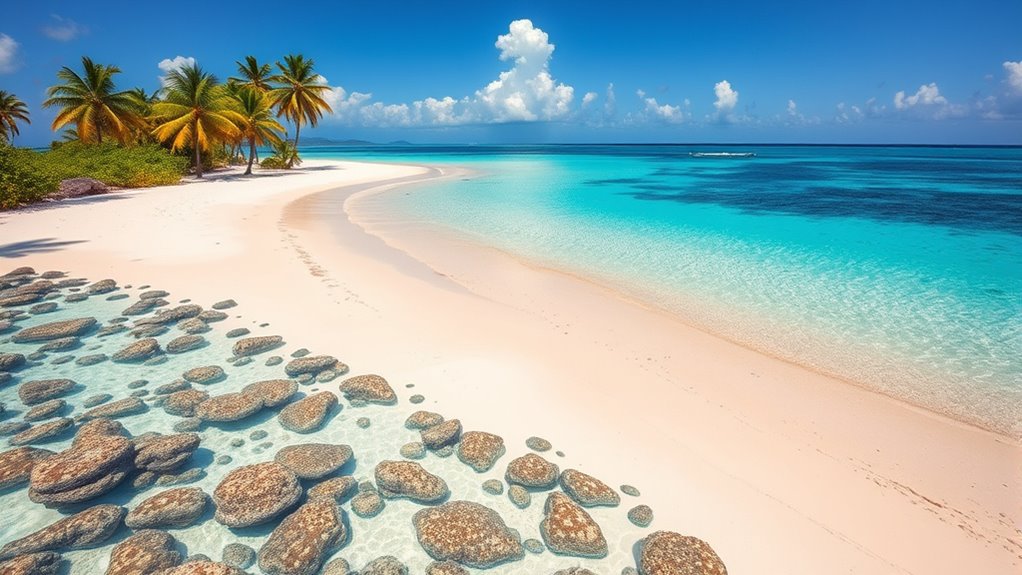
Clean beaches are essential for the health of marine ecosystems and the success of local tourism. When you prioritize beach conservation, you help protect marine biodiversity, which relies on pristine environments to thrive. Healthy beaches support vital habitats for fish, sea turtles, and coral reefs, ensuring these species can reproduce and flourish. For tourists, clean beaches are more inviting, encouraging eco-friendly travel and sustainable practices. Your efforts in keeping beaches free of litter directly contribute to preserving these ecosystems and attracting visitors who value nature. Additionally, maintaining beach cleanliness helps prevent pollution from entering the ocean, which can have detrimental effects on marine life. By understanding the importance of maintaining clean shores, you play a crucial role in safeguarding the natural beauty and ecological integrity of the Bay Islands, ensuring that both marine life and tourism continue to prosper for generations to come.
Challenges Posed by Plastic Pollution on the Islands
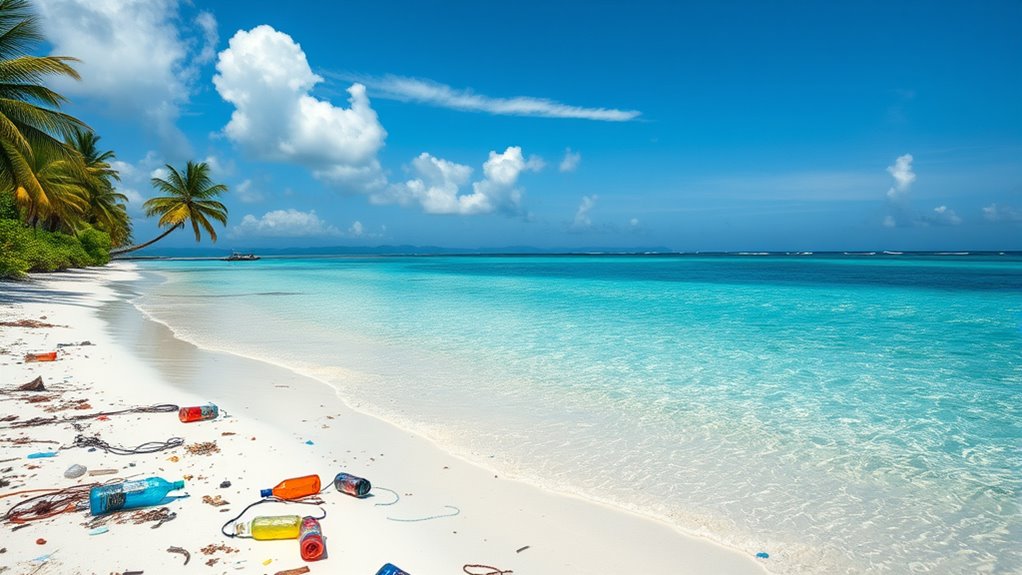
Plastic pollution threatens the marine wildlife and disrupts the delicate coastal ecosystems around the islands. You’ll see how animals mistake trash for food, causing injuries or fatalities, and how habitats suffer from persistent debris. Addressing these challenges is essential to protect the islands’ natural beauty and biodiversity. Implementing effective wall organization systems can also help reduce the amount of visible trash and promote cleaner beaches.
Marine Wildlife Threats
Despite ongoing efforts to protect the islands, plastic pollution continues to pose severe threats to marine wildlife around Honduras’ Bay Islands. Marine debris, such as plastic bags and fishing gear, often accumulates in these waters, creating dangerous obstacles for animals. Sea turtles mistake plastic for food, risking internal injuries or death, while seabirds ingest or become entangled in debris, disrupting their feeding and breeding behaviors. Fish and other marine species can suffer from ingestion of microplastics, which affects their health and the broader food chain. This pollution causes wildlife disturbance, leading to decreased populations and threatening the delicate balance of the ecosystem. The presence of marine debris underscores the importance of effective waste management and community awareness initiatives to combat plastic pollution. Your efforts to reduce plastic waste directly help protect these creatures from the harmful impacts of plastic pollution.
Coastal Ecosystem Damage
Plastic pollution profoundly harms the coastal ecosystems of Honduras’ Bay Islands by disrupting the delicate balance of habitats like coral reefs, mangroves, and beaches. This damage accelerates coastal erosion and threatens marine habitats essential for local wildlife. You might notice:
- Increased coastal erosion as plastics trap sediments and weaken shoreline stability.
- Coral reef degradation caused by plastics smothering corals and blocking sunlight.
- Disruption of mangrove roots, reducing their ability to filter pollutants and stabilize coastlines.
These impacts diminish biodiversity and threaten the health of marine ecosystems. Plastic debris accumulates in critical habitats, impairing their ability to recover from natural and human-induced stresses. Addressing plastic pollution is crucial to preserving the islands’ coastal integrity and marine habitat resilience.
Community-Led Initiatives to Reduce Plastic Waste
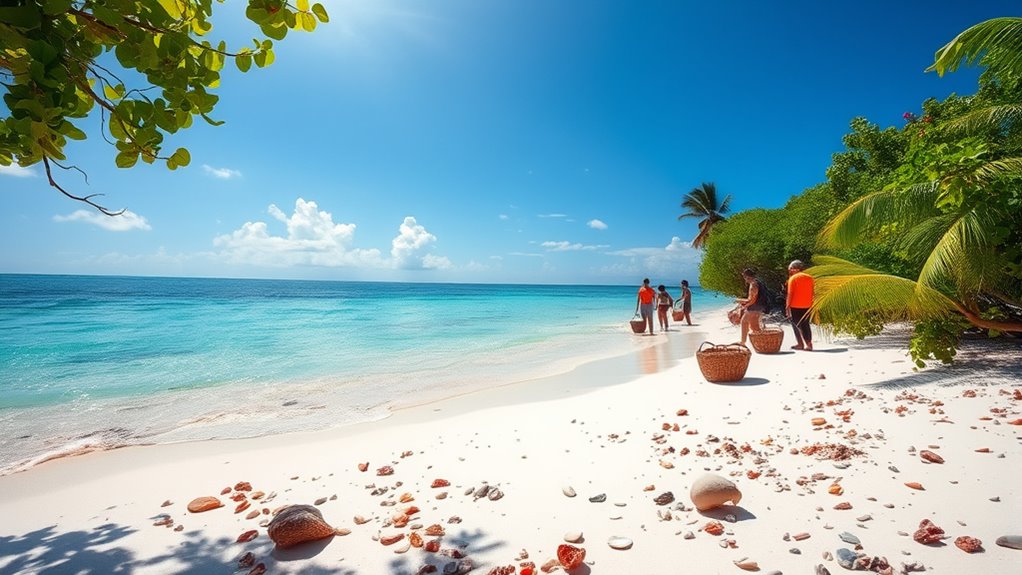
Community-led efforts are making a real difference in reducing plastic waste on the islands. Local cleanup campaigns, educational outreach, and recycling programs empower residents to take action. These initiatives show how collective effort can protect the beaches for future generations. Incorporating sound vibrations into community activities has also been linked to enhancing collective well-being and motivation toward environmental conservation.
Local Cleanup Campaigns
Local cleanup campaigns have become indispensable in maintaining the pristine condition of Honduras’ Bay Islands. These community-led efforts focus on organizing regular beach cleanup events, which directly reduce plastic waste and protect marine life. By participating, you help:
- Remove debris that threatens coral reefs and wildlife
- Educate visitors and locals about waste reduction practices
- Foster a sense of shared responsibility for preserving natural beauty
Your involvement ensures that plastic pollution doesn’t accumulate, keeping beaches cleaner and safer for everyone. These campaigns also inspire sustainable habits, encouraging locals and tourists alike to minimize single-use plastics. As a result, the islands become healthier, more resilient ecosystems. Implementing effective waste management strategies further enhances these efforts. Through collective action, you play a crucial role in safeguarding Honduras’ iconic beaches for generations to come.
Educational Outreach Programs
Building on the momentum of cleanup efforts, educational outreach programs play an essential role in fostering long-term change. By engaging communities directly, you can promote awareness about plastic waste and encourage sustainable habits. These initiatives often include beach cleanup events that educate participants about the impact of litter and how to prevent it. Additionally, local programs emphasize recycling programs, teaching residents how to properly separate waste and reduce plastic use. You can get involved by organizing school workshops, community talks, or social media campaigns that highlight the importance of reducing single-use plastics. To illustrate the impact, consider this table:
| Activity | Focus Area | Outcome |
|---|---|---|
| Beach cleanups | Plastic waste removal | Cleaner beaches, community pride |
| Recycling education | Waste separation techniques | Less plastic in the environment |
| School outreach | Youth awareness | Future stewards of the ocean |
| Community workshops | Sustainable habits | Reduced plastic consumption |
Furthermore, incorporating community-led strategies enhances the effectiveness of these programs by fostering local ownership and sustained engagement.
Community Recycling Initiatives
Because residents take the initiative to organize recycling programs, community recycling initiatives can substantially reduce plastic waste in the Bay Islands. These efforts showcase recycling innovation and community workshops that empower locals to manage waste effectively. Here are three ways your community can make an impact: 1. Organize regular community workshops to educate residents about sustainable waste management. 2. Develop local recycling centers that accept and process plastic waste, encouraging recycling innovation. 3. Launch awareness campaigns to promote plastic reduction and proper disposal practices. Additionally, promoting top 15 laundry detergents with eco-friendly features can further support waste reduction efforts.
Sustainable Practices for Visitors and Locals
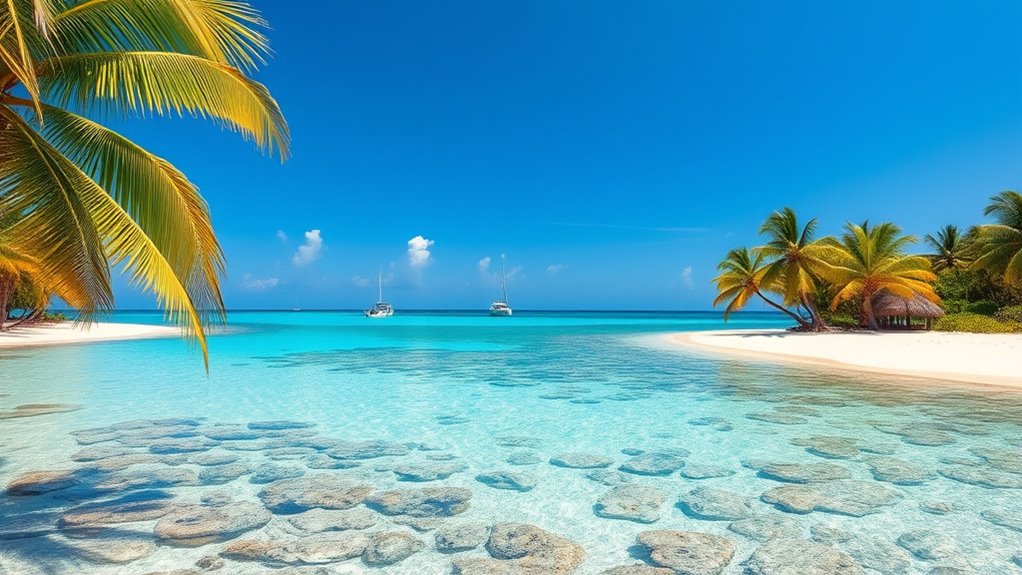
To preserve the pristine beauty of Honduras’ Bay Islands, both visitors and locals need to adopt sustainable practices. Embracing innovative waste management methods helps reduce plastic pollution and keeps beaches clean. Avoid single-use plastics by bringing reusable bottles, bags, and containers. Support eco-friendly tourism by choosing local accommodations that prioritize sustainability and minimize environmental impact. Respect designated recycling areas and participate in beach cleanup activities whenever possible. Educate yourself about proper waste disposal and the importance of protecting marine life. Small daily actions, like avoiding littering and using eco-conscious products, make a significant difference. Incorporating recycling programs into community efforts can further enhance waste management and environmental preservation. By working together and committing to these sustainable practices, you help ensure that the stunning beaches remain vibrant and free of plastic for future generations to enjoy.
Success Stories and Ongoing Projects
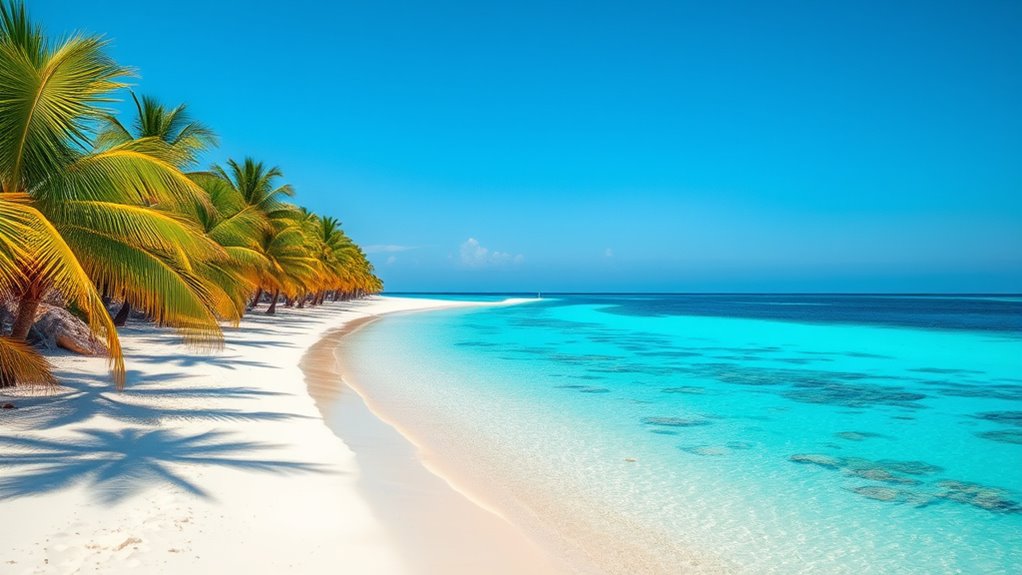
Numerous success stories and ongoing projects demonstrate the positive impact of conservation efforts in Honduras’ Bay Islands. One key initiative is the implementation of innovative recycling programs that turn plastic waste into useful products, reducing pollution and raising awareness. Second, eco-friendly tourism projects now promote responsible travel, encouraging visitors to participate in beach cleanups and sustainable practices. Ultimately, local communities and organizations collaborate to create protected marine areas, ensuring the preservation of marine biodiversity. These efforts showcase how innovative recycling techniques and eco-friendly tourism can transform the region. By supporting these projects, you help strengthen the islands’ commitment to a plastic-free environment. Your involvement helps sustain the positive momentum, ensuring future generations can enjoy pristine beaches and vibrant ecosystems. Additionally, education campaigns about proper waste management and food safety are crucial to maintain long-term environmental health.
How You Can Contribute to a Plastic-Free Bay Islands
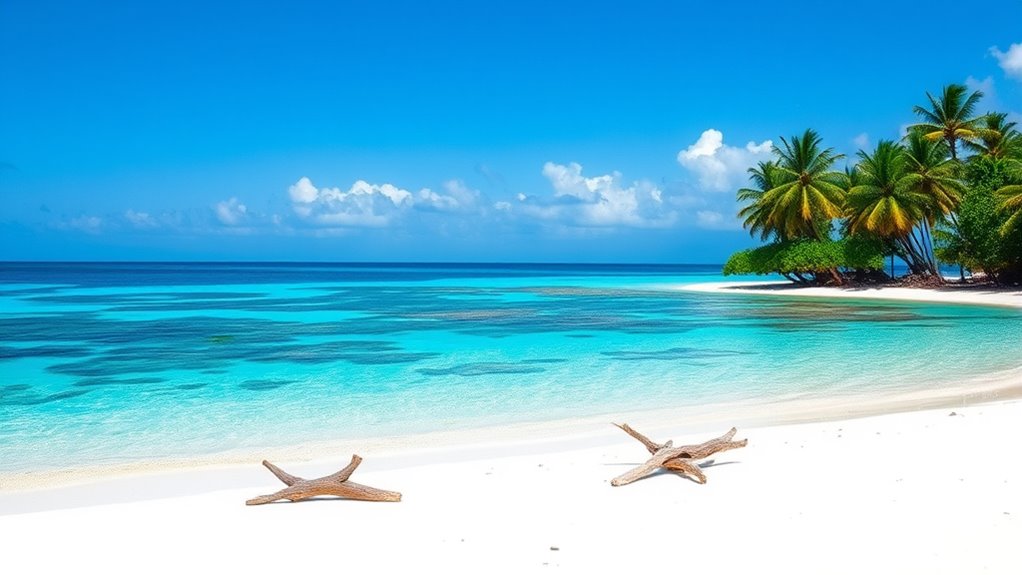
You can make a real difference in preserving the Bay Islands’ pristine beaches by taking simple, intentional actions. Reducing marine debris starts with mindful choices—bring reusable bags, bottles, and containers to avoid single-use plastics. Opt for plastic alternatives like bamboo, glass, or stainless steel whenever possible. Properly dispose of waste and participate in local clean-up efforts to keep beaches free of debris. Educate others about the harmful impact of plastic pollution on marine life and ecosystems. Support businesses that prioritize sustainable practices and avoid products with excessive plastic packaging. Every small effort counts in preventing plastics from reaching the ocean, helping protect the vibrant marine environment of the Bay Islands for generations to come. Being aware of support hours at local parks and attractions can help you plan visits that minimize crowding and environmental impact.
Frequently Asked Questions
What Specific Policies Protect Beaches From Plastic Pollution in Honduras?
You can see that Honduras has implemented policies to protect beaches from plastic pollution through beach cleanup initiatives and community enforcement. These policies encourage local residents and visitors to participate in regular cleanups, helping reduce waste. Community enforcement guarantees strict adherence to waste disposal rules, preventing plastic from reaching the shores. By supporting these efforts, you help maintain cleaner beaches and protect marine ecosystems in Honduras.
How Do Local Economies Benefit From Maintaining Plastic-Free Beaches?
You’ll notice that maintaining plastic-free beaches boosts eco-tourism benefits, drawing visitors seeking pristine environments. This naturally increases local employment, as businesses thrive on tourism-related services like hotels, restaurants, and tours. When beaches stay clean, communities flourish, and sustainable practices become a core part of the economy. It’s a positive cycle where protecting natural beauty directly supports local livelihoods, making the area more attractive and resilient in the long run.
Are There Any Restrictions on Plastic Use During Tourism Activities?
During tourism activities, restrictions on plastic use often aim to protect the environment. You might find that local regulations encourage eco-tourism initiatives and promote beach cleanup efforts, reducing plastic waste. These restrictions help preserve natural beauty, benefiting both visitors and the community. By adhering to these rules, you support sustainable tourism and contribute to maintaining pristine beaches, ensuring future generations enjoy the same stunning landscapes.
How Do Plastic-Free Beaches Impact Marine Biodiversity Compared to Polluted Areas?
You see, plastic-free beaches protect marine habitats, support species diversity, and foster vibrant ecosystems. When you choose pristine, pollution-free shores, you help sustain healthy marine environments, allowing countless species to thrive. In contrast, polluted areas threaten marine habitats with debris, endangering species diversity and disrupting natural balances. Your actions directly influence the health of oceans, ensuring future generations can enjoy thriving, resilient marine ecosystems.
What Educational Programs Are Available to Promote Plastic Reduction Awareness?
You can participate in various educational programs focused on plastic reduction awareness. Many organizations promote community engagement and youth outreach through workshops, school programs, and awareness campaigns. These initiatives teach you about the harmful effects of plastic pollution and how you can make a difference. By getting involved, you help spread important messages, encourage sustainable habits, and protect marine environments, making a real impact in your community and beyond.
Conclusion
By choosing to keep the beaches pristine, you become a essential brushstroke in the vibrant canvas of Honduras’ Bay Islands. Your actions can turn the tide against plastic pollution, transforming these islands into sparkling jewels of natural beauty. Every piece of trash you avoid or remove helps preserve a fragile paradise, ensuring marine life thrives and future generations can bask in its unspoiled splendor. Together, you hold the power to keep these beaches a shining beacon of hope.

